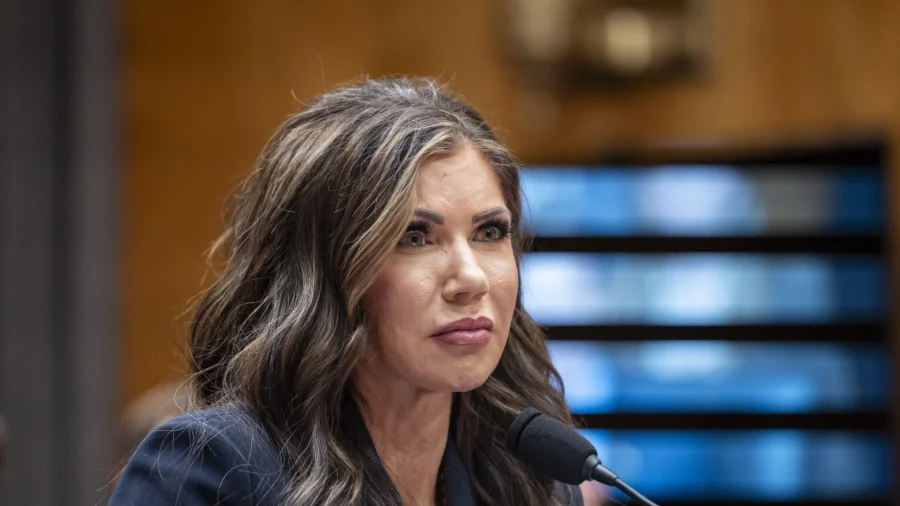In a notable development concerning U.S. immigration policy, Homeland Security Secretary Kristi Noem announced on Monday the termination of deportation protections for nearly 348,000 Venezuelans living in the United States under the Temporary Protected Status (TPS) program. This decision marks a significant shift in immigration policy, with widespread implications for affected Venezuelan families.
The TPS program was initially designed to offer temporary relief to individuals from countries experiencing extraordinary conditions such as armed conflict, environmental disasters, or other unsafe circumstances. Venezuelans were granted TPS due to the severe political, economic, and humanitarian crisis in their home country. However, the Department of Homeland Security (DHS) has now cited “notable improvements” in Venezuela’s economy, public health, and crime rates as the rationale for ending these protections.

This move is part of a broader immigration policy change, coinciding with renewed enforcement measures. According to reports from Reuters, thousands of Venezuelans could face deportation and the loss of their work permits as early as April 2025. The announcement has sparked fear and uncertainty within the Venezuelan immigrant community in the U.S.
“I don’t know what will happen,” said Ana Maria Pirela, a 26-year-old Venezuelan migrant who holds temporary protected status. “Yesterday they fired my husband from his job—he had been managing a food store for two months—and I’m two months pregnant. I don’t want to go back to Venezuela.”
Venezuelan activist Beatriz Olavarria has expressed grave concerns about the potential consequences of revoking TPS for nearly 350,000 Venezuelans within a 60-day timeframe. She warned that returning to Venezuela could be life-threatening for some, while others might face imprisonment due to their political activities or public criticism of the Venezuelan government.
“Some of those people who are here, who have spoken about the situation in Venezuela on cameras and everywhere, if they set foot in Venezuela, they will be jailed,” Olavarria told NBC6 South Florida.
This policy shift also reflects a reversal of previous immigration policies under former President Joe Biden. The Biden administration had expanded TPS protections to cover over one million people from 17 nations, including Venezuelans fleeing political repression and economic instability. Many of these individuals arrived through legal humanitarian pathways during Biden’s tenure, and deporting them has proven challenging due to strained diplomatic relations between the U.S. and Venezuela.
However, under the renewed immigration agenda, Kristi Noem recently canceled an 18-month extension of TPS for Venezuelans and ended the practice of automatic six-month renewals. While approximately 300,000 Venezuelans still have TPS valid until September, their long-term future in the U.S. remains uncertain.

Tatiana Vazquez, a Venezuelan migrant living in Atlanta, described the anxiety that many families are experiencing. “Yesterday ICE took a friend and her husband. There’s anguish,” she said. Vazquez’s family has applied for asylum in the U.S., but they live in constant fear after witnessing recent arrests conducted by Immigration and Customs Enforcement (ICE).
Looking ahead, the Trump administration is reportedly considering the termination of another Biden-era program that allowed approximately 530,000 individuals from Cuba, Haiti, Nicaragua, and Venezuela to live and work legally in the U.S. if they had sponsors. According to sources familiar with the matter, a decision on this program could be announced within weeks.

Meanwhile, Venezuela continues to grapple with economic challenges. Despite efforts by President Nicolas Maduro to control inflation, the country’s monthly minimum wage remains alarmingly low, at around $3. Maduro, who began his third term amid contested elections and ongoing allegations of drug trafficking (which he denies), faces persistent opposition both domestically and internationally.
According to the United Nations High Commissioner for Refugees (UNHCR), more than 7.7 million people have fled Venezuela since the political and economic crisis intensified under Maduro’s leadership. The Venezuelan opposition has been vocal in urging the U.S. to maintain TPS, emphasizing the dire conditions that migrants would face if forced to return to Venezuela.

For many Venezuelan families in the U.S., TPS has been a lifeline, providing legal status, work authorization, and protection from deportation. The potential loss of these protections is causing widespread concern, particularly among those who have established lives, careers, and families in the U.S.
Community organizations and immigration advocacy groups are mobilizing to support affected individuals. Legal aid organizations are offering resources and guidance to help TPS holders explore other immigration options, such as asylum or family-based petitions. Advocacy groups are also urging Congress to pass legislation that would provide a more permanent solution for TPS holders, including a potential pathway to citizenship.
In response to the policy change, protests and demonstrations have been organized in various cities across the U.S., with Venezuelan immigrants and their allies calling for the reinstatement of TPS protections. They argue that conditions in Venezuela remain unsafe and that deporting individuals back to such an environment is both inhumane and unjust.
“TPS has allowed me to build a life here, to work legally, and to provide for my family,” said Maria Gonzalez, a Venezuelan TPS holder living in Florida. “Now I feel like everything we’ve worked for is at risk. We need the U.S. government to understand that going back to Venezuela is not an option for us.”
The broader implications of this policy shift extend beyond the Venezuelan community. It highlights the ongoing debate over U.S. immigration policy and the balance between border security, humanitarian protection, and economic contributions of immigrant communities. The decision to terminate TPS for Venezuelans has reignited discussions about the need for comprehensive immigration reform that addresses the complexities of modern migration patterns.

As the situation unfolds, affected individuals are encouraged to seek legal advice and stay informed about any updates regarding their immigration status. Immigration advocates continue to push for policies that prioritize human rights, family unity, and the protection of vulnerable populations.
In conclusion, the termination of TPS for Venezuelans marks a significant moment in U.S. immigration policy, with far-reaching consequences for thousands of individuals and families. As legal battles and advocacy efforts continue, the future remains uncertain for many Venezuelan immigrants who have made the U.S. their home.


